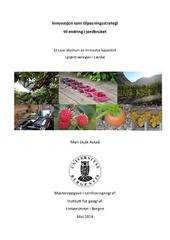| dc.description.abstract | This paper addresses innovative capacity in an agricultural industry. Agricultural industries are dependent on adapting to changing conditions of production. The future climate changes will most likely lead to an increased insecurity for food production, and to have capacity to adapt will consequently become even more important. Since we cannot know which specific changes a global warming will demand, this paper assumes that agricultural industries that are innovative today, also will be equipped with the ability to meet changing conditions of production in the future. The purpose of this paper is thus to identify favourable factors for innovation in an agricultural industry. In an attempt to do this I have studied the innovative capacity in the fruit and vegetable industry in Lærdal in Sogn og Fjordane in Norway. In the mid-1990s the fruit and vegetable industry in Lærdal was hit by various incidents which demanded a change in the industry. The industry has introduced different radical and incremental innovations, and is today an industry in growth. The innovations systems approach view innovation as an interactive process between actors in a system. Learning and knowledge transfers between different relevant actors are central processes which lead to innovative activity in the system. Through participant observation and semi-structured interviews I have gathered information about central actors in the fruit and vegetable industry and interactions between these which has contributed to develop innovative processes in Lærdal. The main findings from the fruit and vegetable industry in Lærdal show that cooperation instead of competition and the use of complementary knowledge from both external and internal actors have been important for the innovative capacity in the industry. In addition to social processes, favourable natural conditions have made it possible for the farmers to grow a variety of cultivars and to change in meeting with demands from the market. The research thus promotes that both social processes and natural resources are crucial to explain innovative capacity in an agricultural industry. | en_US |
